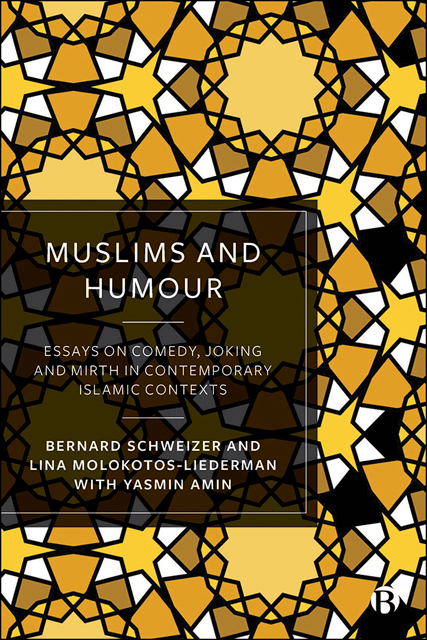Book contents
- Frontmatter
- Contents
- Notes on Contributors
- Acknowledgements
- Introduction
- Part I Theoretical Perspectives on Islam and Humour
- Part II Muslim Humour Practices in Islamicate Societies: Textual Media
- Part III Muslim Humour Practices in Islamicate Societies: Visual Media and Performance
- Part IV Muslim Comedy in North America
- Conclusion
- Bibliography on Islam and Humour
- Index
Introduction
Published online by Cambridge University Press: 13 October 2022
- Frontmatter
- Contents
- Notes on Contributors
- Acknowledgements
- Introduction
- Part I Theoretical Perspectives on Islam and Humour
- Part II Muslim Humour Practices in Islamicate Societies: Textual Media
- Part III Muslim Humour Practices in Islamicate Societies: Visual Media and Performance
- Part IV Muslim Comedy in North America
- Conclusion
- Bibliography on Islam and Humour
- Index
Summary
If one looked to the formative figures of the three monotheistic world religions for an indication of the role that laughter plays in each of the three respective faiths, then one would have to conclude that Islam is the most explicitly pro-laughter religion among them. Prophet Muḥammad clearly appears to have had a penchant for merriment, and the various authoritative ḥadīth collections record scores of instances where the Prophet was smiling, chuckling, or laughing. By contrast, Christian religious thinkers following Saint Chrysostom have repeatedly pointed out that ‘Christ never laughed’ (Kuschel, 1994: 27; Viladesau, 2018: 213). Indeed, anybody scouring the four Gospels for indications of Jesus in the act of laughing will come away empty-handed (though Christ did display a range of other emotions from sadness to joy and anger). As for the most important prophet in Judaism, Moses does not appear to have had a mirthful disposition (Morreall, 2001: 294– 295). As judged from scenes in the Hebrew Bible – and as reflected in statuary and paintings the world over – Moses was a solemn man, given to delivering stern commands or berating his restive followers rather than encouraging levity. But, as Part I in our collection illustrates, when it comes to Prophet Muḥammad, a different picture emerges, namely, that of a man who liked to laugh.
Taken by itself, of course, the mere presence of laughter (or smiling, for that matter) need not be conclusive proof that something is perceived as funny (Provine, 2000; Morreall, 2001). In his recent book on humour, Terry Eagleton lists a total of 23 forms of laughter (from ‘nervous’ to ‘wicked’) that – as he bluntly puts it – ‘have little or nothing to do with humour’ (2019: 2). Hence, some caution is indicated when linking laughter with humour. Divine laughter is a case in point since it often comes across as supremely humourless. When Yahweh laughs in the Hebrew Bible, which is not very often, he almost always does so out of contempt and disdain (Koestler, 1964: 52– 53). This is demonstrated in passages of the Hebrew Bible such as Psalm 2, where we read that ‘He who sits in the heavens laughs; the Lord has them in derision / Then he will speak to them in his wrath, and terrify them in his fury.’
- Type
- Chapter
- Information
- Muslims and HumourEssays on Comedy, Joking, and Mirth in Contemporary Islamic Contexts, pp. 1 - 16Publisher: Bristol University PressPrint publication year: 2022



